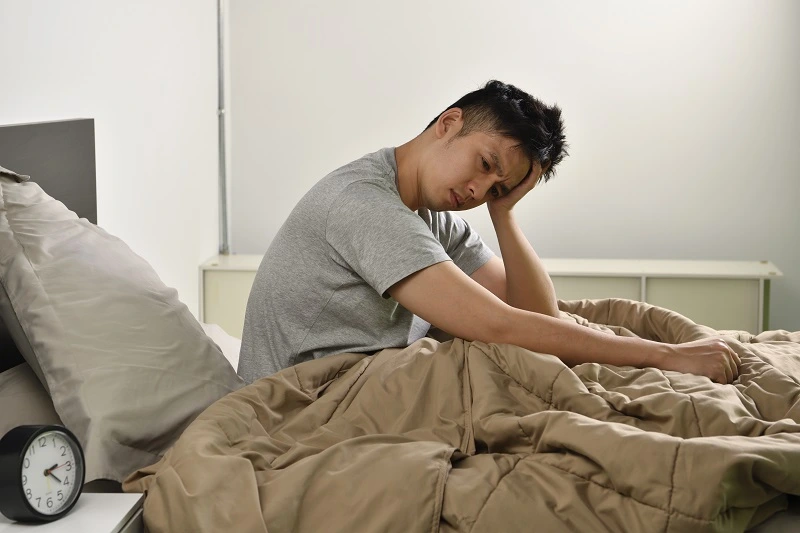Finding it hard to sleep at night can be quite annoying. After all, we have activities to do the next morning, but at night, we struggle to fall asleep. In fact, getting enough quality sleep greatly impacts the activities we will undertake. Difficulty sleeping can affect both physical and mental health. Lack of sleep can lead to frequent headaches or difficulty concentrating. Common causes of sleep difficulties include stress, depression, and other health issues.
Causes of Difficulty Sleeping
According to a journal published by the American Psychiatric Association (2013), the causes of difficulty sleeping vary. It depends on each person's physical condition.
1. Stress
Stress is one of the causes of difficulty sleeping. Stress can be triggered by concerns about work, school, health, finances, or family. This stress keeps your mind active at night, making it hard to sleep.
2. Mental Health
Mental health conditions, such as anxiety, depression, and bipolar disorder, often cause serious sleep problems. Disturbed mental health can lead to negative thoughts that disrupt sleep.
3. Lifestyle
Unhealthy habits and routines related to lifestyle, such as consuming unhealthy food and drinks, can cause difficulty sleeping. Unhealthy foods and drinks include caffeine, alcohol, and fast food.
4. Physical Health
Physical health significantly impacts the quality of sleep. If you’re experiencing pain or discomfort, sleep will likely be disrupted. Almost all pain-related conditions can interfere with sleep by making it harder to lie comfortably in bed.
5. Poor Sleep Habits
Poor sleep habits can make it hard to sleep at night. These habits include irregular sleep schedules, daytime naps, and engaging in stimulating activities before bed.
6. Eating Too Much Before Bed
Eating a light snack before bed isn’t a problem. However, having a heavy meal can make it hard to sleep. Eating too much can cause heartburn, keeping you awake at night.
7. PMS
Women with PMS often have difficulty sleeping due to hormonal changes. These changes can affect your body temperature and melatonin production, which is important for sleep. Mood changes from PMS can also make it harder to get a good night's sleep.
8. Medication
Sometimes, difficulty sleeping is a side effect of various medications. These can include blood pressure medications, anti-asthma medications, and antidepressants. Other medications may cause daytime drowsiness, disrupting one's sleep schedule. It’s not just taking medications that can interfere with sleep; withdrawal from medication can also lead to sleep problems.
Symptoms of Sleep Disorders
- Difficulty falling asleep at night
- Waking up frequently during the night
- Waking up too early
- Not feeling well-rested after a night's sleep
- Fatigue or sleepiness during the day
- Irritability
- Difficulty focusing
- Difficulty staying awake when sitting still
- Appearing tired to others
- Constant need for caffeine
Types of Sleep Disorders
According to helpguide.org, here are 4 types of sleep disorders.
1. Insomnia
Insomnia is the inability to fall asleep or stay asleep at night. It can be caused by stress, jet lag, health conditions, medications, or even the amount of coffee you drink. Insomnia can also be caused by sleep disorders or mood disorders, such as anxiety and depression.
2. Sleep Apnea
Sleep apnea is a common sleep disorder where your breathing temporarily stops during sleep, causing you to wake up frequently. If you have sleep apnea, you may not remember waking up, but you might feel tired, irritable, or depressed during the day and experience reduced productivity.
3. Restless Leg Syndrome (RLS)
This disorder causes an irresistible urge to move your legs at night. The urge to move occurs when you’re resting or lying down, usually caused by uncomfortable, tickling, or painful sensations.
4. Narcolepsy
Narcolepsy is a sleep disorder involving excessive, uncontrollable daytime sleepiness. It’s caused by a dysfunction in the brain's sleep-wake control mechanism. If you have narcolepsy, you might suddenly fall asleep while talking, working, or even driving.
Ways to Overcome Difficulty Sleeping
1. Lifestyle Changes
One way to overcome sleep difficulty is by changing your lifestyle. These changes can improve sleep quality. Examples include:
- Avoiding caffeine and alcohol
- Limiting naps to 30 minutes or avoiding them altogether if possible
- Avoiding brain-stimulating activities before bed
- Maximizing sleep time to 7-8 hours per day
2. Medical Consultation
If sleep difficulties are affecting you, consider consulting a doctor. If anxiety or depression affects your sleep, your doctor may prescribe anti-anxiety or antidepressant medications to help you manage stress, anxiety, and hopelessness.

Post a Comment for "8 Causes of Insomnia and how to Overcome Them"